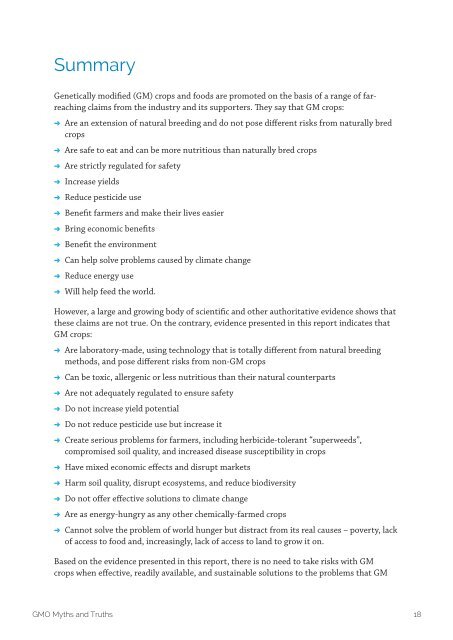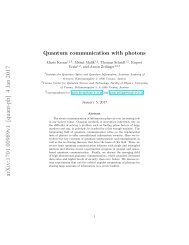- Page 1 and 2: GMO Myths and Truths An evidence-ba
- Page 3 and 4: First edition published in Great Br
- Page 5 and 6: 1.4 Myth: Cisgenesis is a safe form
- Page 7 and 8: Myth at a glance...................
- Page 9 and 10: Conclusion.........................
- Page 11 and 12: 5.14 Myth: GM crops reduce energy u
- Page 13 and 14: GMOs and attack GMO critics again a
- Page 15 and 16: Finally, we always cite our sources
- Page 17: stance on GMOs has nothing to do wi
- Page 21 and 22: of all the genes needed to construc
- Page 23 and 24: ways that are not well understood o
- Page 25 and 26: generation of a GM crop constitutes
- Page 27 and 28: genome of the recipient plant cells
- Page 29 and 30: able to overcome these limitations
- Page 31 and 32: Muddying the waters with imprecise
- Page 33 and 34: may be harmed when feeding on Bt GM
- Page 35 and 36: that the GM genes confer on the org
- Page 37 and 38: 3. The development of GM plant cell
- Page 39 and 40: DNA and an enzyme to cut both stran
- Page 41 and 42: the proteins present in RTDS GMOs (
- Page 43 and 44: 1.3 Myth: Genetic engineering of cr
- Page 45 and 46: plant breeding retains strong links
- Page 47 and 48: In addition, if mutations were to o
- Page 49 and 50: For these reasons, conventional bre
- Page 51 and 52: eplacements in Drosophila. Proc Nat
- Page 53 and 54: However, cisgenesis still carries m
- Page 55 and 56: References 1. Jones JDG, Witek K, V
- Page 57 and 58: 2.1 Myth: GM foods are strictly tes
- Page 59 and 60: How GMOs first entered world market
- Page 61 and 62: FDA, that the GMO is safe. Instead
- Page 63 and 64: “The concept of substantial equiv
- Page 65 and 66: e compositionally different, 42 wer
- Page 67 and 68: same genetic background as the GMO,
- Page 69 and 70:
EFSA disregards advice of its own h
- Page 71 and 72:
Catchpole and colleagues (above). R
- Page 73 and 74:
GMO assessment turns its back on sc
- Page 75 and 76:
available for scrutiny by the publi
- Page 77 and 78:
professional or financial affiliati
- Page 79 and 80:
Unexpected effects from gene-silenc
- Page 81 and 82:
mice fed the plants in question. 10
- Page 83 and 84:
GM salmon The biotechnology aquacul
- Page 85 and 86:
8. Shibko SL. Memorandum to James H
- Page 87 and 88:
63. Perry J. Comment by Joe Perry,
- Page 89 and 90:
2.2 Myth: Independent studies confi
- Page 91 and 92:
“The way US schools get access to
- Page 93 and 94:
NK603, which is engineered to toler
- Page 95 and 96:
EFSA had also previously argued tha
- Page 97 and 98:
about his UK government-funded rese
- Page 99 and 100:
Attempts to uncover the identity of
- Page 101 and 102:
29. Malatesta M, Caporaloni C, Gava
- Page 103 and 104:
The following analysis of the Nicol
- Page 105 and 106:
In conclusion, the above categories
- Page 107 and 108:
food. The study (Séralini et al, 2
- Page 109 and 110:
4. As evidence of GMO safety, Nicol
- Page 111 and 112:
the pipeline for approval would mee
- Page 113 and 114:
dsRNA. However, when Monsanto intro
- Page 115 and 116:
Nicolia and colleagues included the
- Page 117 and 118:
insecticides applied. When non-GM f
- Page 119 and 120:
herbicide to control weeds, includi
- Page 121 and 122:
human and animal health or for the
- Page 123 and 124:
37. Séralini GE, Cellier D, Spirou
- Page 125 and 126:
corn borer-protected corn. Food Che
- Page 127 and 128:
3. Health hazards of GM foods “Th
- Page 129 and 130:
Unintended changes in composition G
- Page 131 and 132:
The fact that beans naturally conta
- Page 133 and 134:
inflammation than pigs fed an equiv
- Page 135 and 136:
Intestinal abnormalities Mice fed a
- Page 137 and 138:
Misuse of “biological relevance
- Page 139 and 140:
its effect. In this way, any change
- Page 141 and 142:
that correspond to around seven yea
- Page 143 and 144:
must be tested; and in the case of
- Page 145 and 146:
24. Brasil FB, Soares LL, Faria TS,
- Page 147 and 148:
3.2 Myth: The Séralini (2012) stud
- Page 149 and 150:
These serious effects had not shown
- Page 151 and 152:
and colleagues suggested in their p
- Page 153 and 154:
The “too few rats” criticism Th
- Page 155 and 156:
While no research study is perfect
- Page 157 and 158:
that the retraction of any paper on
- Page 159 and 160:
28. Meyer H, Hilbeck A. Rat feeding
- Page 161 and 162:
The Snell review A review by Snell
- Page 163 and 164:
Russian long-term studies not follo
- Page 165 and 166:
20. GMOSeralini.org. Criticism: Sé
- Page 167 and 168:
animals, which in some cases were s
- Page 169 and 170:
References 1. International Service
- Page 171 and 172:
favourable conclusion on GMO safety
- Page 173 and 174:
Based on current immunological know
- Page 175 and 176:
the public knew about and that coul
- Page 177 and 178:
modifications into the bacteria use
- Page 179 and 180:
7. Garrett L. Genetic engineering f
- Page 181 and 182:
Regulators have approved GM Bt crop
- Page 183 and 184:
➜ ➜ New toxins produced in the
- Page 185 and 186:
References 1. Székács A, Darvas B
- Page 187 and 188:
3.9 Myth: Myth: GM foods are rigoro
- Page 189 and 190:
“There is more than a casual asso
- Page 191 and 192:
This was not a regulatory test and
- Page 193 and 194:
3.10 Myth: GM animal feed poses no
- Page 195 and 196:
genes in the gut, which could then
- Page 197 and 198:
3.11 Myth: Genetic engineering will
- Page 199 and 200:
tract. 11 Yet in real-life conditio
- Page 201 and 202:
antioxidant. So the benefits of ant
- Page 203 and 204:
18. Pollan M. The way we live now:
- Page 205 and 206:
4.1 Myth: Roundup is a safe herbici
- Page 207 and 208:
compared with the active ingredient
- Page 209 and 210:
➜➜ Glyphosate alone increased t
- Page 211 and 212:
The EU’s 2002 review of industry
- Page 213 and 214:
precautionary principle was not bei
- Page 215 and 216:
corn and soybeans resistant to 2,4-
- Page 217 and 218:
27. Walsh LP, McCormick C, Martin C
- Page 219 and 220:
4.2 Myth: Strict regulations ensure
- Page 221 and 222:
in vitro (non-animal laboratory stu
- Page 223 and 224:
the human or animal consumer when p
- Page 225 and 226:
People and animals are not protecte
- Page 227 and 228:
6. Codex Alimentarius. Pesticide re
- Page 229 and 230:
5. GM crops - impacts on the farm a
- Page 231 and 232:
of canola varieties in Australia co
- Page 233 and 234:
productivity in the United States a
- Page 235 and 236:
5.2 Myth: GM crops decrease pestici
- Page 237 and 238:
“Herbicide-resistant crop technol
- Page 239 and 240:
The GM industry “solution” to s
- Page 241 and 242:
294X.2007.03567.x. 26. Knispel AL,
- Page 243 and 244:
GM proponents claim that GM Bt crop
- Page 245 and 246:
exposing pests to the toxin. This i
- Page 247 and 248:
cutworm has increased significantly
- Page 249 and 250:
Given the extreme toxicity of neoni
- Page 251 and 252:
5.4 Myth: GM Bt crops only affect t
- Page 253 and 254:
lines of Bt maize. Am J Bot. 2012;9
- Page 255 and 256:
In no-till cultivation of GM herbic
- Page 257 and 258:
5.6 Myth: Roundup is a benign herbi
- Page 259 and 260:
leghemoglobin, which helps bind nit
- Page 261 and 262:
5.7 Myth: GM crops help biodiversit
- Page 263 and 264:
maize was only found better for wil
- Page 265 and 266:
“Farm financial impacts [of adopt
- Page 267 and 268:
Department of Agriculture. Its gran
- Page 269 and 270:
5.9 Myth: GM crops increase farmer
- Page 271 and 272:
5.10 Myth: GM crops can “coexist
- Page 273 and 274:
➜➜ In 2006 an unapproved experi
- Page 275 and 276:
default/files/content/attachments/f
- Page 277 and 278:
Based on very limited experimental
- Page 279 and 280:
integrated into the DNA of the cell
- Page 281 and 282:
propagation with the best-performin
- Page 283 and 284:
11. Mazza R, Soave M, Morlacchini M
- Page 285 and 286:
crops that would help humankind sur
- Page 287 and 288:
12. Atser G. Nigeria releases two e
- Page 289 and 290:
continued to rise. 4 According to s
- Page 291 and 292:
5.14 Myth: Myth: GM crops reduce en
- Page 293 and 294:
compost and chemical fertilizer wer
- Page 295 and 296:
6. Feeding the world “Something a
- Page 297 and 298:
6.1 Myth: Myth: GM crops are needed
- Page 299 and 300:
But almost nothing appears to have
- Page 301 and 302:
and the control exercised by big co
- Page 303 and 304:
6.2 Myth: GM crops are vital to ach
- Page 305 and 306:
A 2008 United Nations report looked
- Page 307 and 308:
“A key question for our scientist
- Page 309 and 310:
zvNSpL. Published March 9, 2012. 23
- Page 311 and 312:
Biofuels are crops used for fuel. V
- Page 313 and 314:
Currently available GM crops are en
- Page 315 and 316:
When people hear about “supercrop
- Page 317 and 318:
2. Conventionally bred crop without
- Page 319 and 320:
Salt-tolerant ➜➜ Rice varieties
- Page 321 and 322:
Consumer appeal A GM non-browning a
- Page 323 and 324:
varieties adapted to local conditio
- Page 325 and 326:
display_description.php?variety_nam
- Page 327 and 328:
Conclusion The introduction of GM c
- Page 329 and 330:
crops and foods will be consigned t
- Page 331:
GMO Myths and Truths 331






